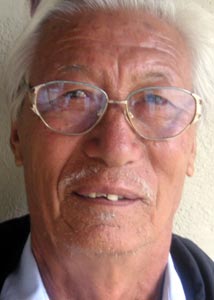Name: Lhundup Dorjee
(Alias: Yes)
Gender: Male
Interview Age: 78
Date of Birth: 1929
Birthplace: Menjay, Utsang, Tibet
Year Left Tibet: 1960
Profession: Agriculture, Dairy Farming
Monk/Nun: No
Political Prisoner: No

Interview No.: 73
Date: 2007-07-04
Language: Tibetan
Location: Dickey Larsoe Settlement, Bylakuppe, Karnataka, India
Categories: Chinese Invasion and Occupation
Keywords: childhood memories, Chinese -- first appearance of, Chinese -- oppression under, Chinese rule -- life under, escape experiences, government/administration, monasteries -- relationship with , refugee in India -- life as, taxes, thamzing/struggle sessions, Utsang
Summary:
Lhundup Dorjee describes how his family gave him away in marriage to a woman whose family lived as tenants of Dechen Sangakha Monastery. This family acted as the ngotsap 'representative' of the monastery and performed various functions for it, including collecting butter and grain taxes. Lhundup Dorjee explains the roles played by genpo 'leaders' and ngotsap in collecting taxes on behalf of the government and private estates, in settling disputes, and in looking after villagers' welfare.
Lhundup Dorjee provides an account of increasing Chinese oppression after the occupation of his region, including the tactics the Chinese used to force Tibetans into conducting thamzing 'struggle sessions.' The person subjected to thamzing had his hands tied behind him and was ordered to kneel in front of a huge gathering of people, some who participated in the beating of the accused.
Lhundup Dorjee also describes the difficulties he and hundreds of other fleeing Tibetans faced when they reached Bhutan, including food shortages and death from heat exhaustion. Upon reaching India, he worked on road construction for eight years before moving to Bylakuppe.
Interview Team:
- Rebecca Novick (Interviewer)
- Ronny Novick (Videographer)
- Tsering Dorjee (Interpreter)

